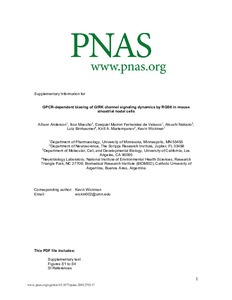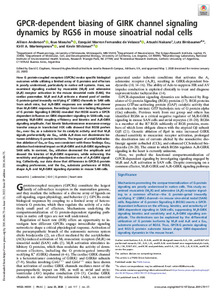Por favor, use este identificador para citar o enlazar este ítem:
https://repositorio.uca.edu.ar/handle/123456789/14237| Título: | GPCR-dependent biasing of GIRK channel signaling dynamics by RGS6 in mouse sinoatrial nodal cells | Autor: | Anderson, Allison Masuho, Ikuo Marrón Fernández de Velasco, Ezequiel Nakano, Atsushi Birnbaumer, Lutz Martemyanov, Kirill A. Wickman, Kevin |
Palabras clave: | RITMO CARDIACO; Kir3; ADENOSINA | Fecha de publicación: | 2020 | Editorial: | National Academy of Sciences | Cita: | Anderson, A., et al. GPCR-dependent biasing of GIRK channel signaling dynamics by RGS6 in mouse sinoatrial nodal cells [en línea]. Proceedings of the National Academy of Sciences (PNAS). 2020, 117(25) doi:10.1073/pnas.2001270117 Disponible en: https://repositorio.uca.edu.ar/handle/123456789/14237 | Resumen: | Abstract: How G protein-coupled receptors (GPCRs) evoke specific biological outcomes while utilizing a limited array of G proteins and effectors is poorly understood, particularly in native cell systems. Here, we examined signaling evoked by muscarinic (M2R) and adenosine (A1R) receptor activation in the mouse sinoatrial node (SAN), the cardiac pacemaker. M2R and A1R activate a shared pool of cardiac G protein-gated inwardly rectifying K+ (GIRK) channels in SAN cells from adult mice, but A1R-GIRK responses are smaller and slower than M2R-GIRK responses. Recordings from mice lacking Regulator of G protein Signaling 6 (RGS6) revealed that RGS6 exerts a GPCRdependent influence on GIRK-dependent signaling in SAN cells, suppressing M2R-GIRK coupling efficiency and kinetics and A1R-GIRK signaling amplitude. Fast kinetic bioluminescence resonance energy transfer assays in transfected HEK cells showed that RGS6 prefers Gαo over Gαi as a substrate for its catalytic activity and that M2R signals preferentially via Gαo, while A1R does not discriminate between inhibitory G protein isoforms. The impact of atrial/SAN-selective ablation of Gαo or Gαi2 was consistent with these findings. Gαi2 ablation hadminimal impact onM2R-GIRK and A1R-GIRK signaling in SAN cells. In contrast, Gαo ablation decreased the amplitude and slowed the kinetics of M2R-GIRK responses, while enhancing the sensitivity and prolonging the deactivation rate of A1R-GIRK signaling. Collectively, our data show that differences in GPCR-G protein coupling preferences, and the Gαo substrate preference of RGS6, shape A1R- and M2R-GIRK signaling dynamics in mouse SAN cells. | URI: | https://repositorio.uca.edu.ar/handle/123456789/14237 | ISSN: | 0027-8424 (impreso) 1091-6490 (online) |
Disciplina: | MEDICINA | DOI: | 10.1073/pnas.2001270117 | Derechos: | Acceso abierto | Fuente: | Proceedings of the National Academy of Sciences (PNAS). 2020, 117(25) |
| Aparece en las colecciones: | Artículos |
Ficheros en este ítem:
| Fichero | Descripción | Tamaño | Formato | |
|---|---|---|---|---|
| pnas.2001270117.sapp.pdf | Material suplementario | 422,38 kB | Adobe PDF |  Visualizar/Abrir |
| GPCR-dependent biasing.pdf | 1,71 MB | Adobe PDF |  Visualizar/Abrir |
Visualizaciones de página(s)
31
comprobado en 27-abr-2024
Descarga(s)
45
comprobado en 27-abr-2024
Google ScholarTM
Ver en Google Scholar
Altmetric
Altmetric
Este ítem está sujeto a una Licencia Creative Commons

